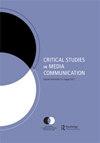Understanding transnational decontextualization-recontextualization through Shingeki no Kyojin: The perils and possibilities surrounding Japanese manga and anime
IF 1.5
2区 文学
Q3 COMMUNICATION
引用次数: 0
Abstract
ABSTRACT Japanese anime has continued to gain recognition as one of the strongest cultural influences in a globalized world. We examine how the transnational process of decontextualization-recontextualization can shift the messages of popular culture texts as situated in differing collective memories. To highlight this process, we analyze Shingeki no Kyojin (known to English-speaking audiences as Attack on Titan). Shingeki no Kyojin provides insightful grounds for analysis given its tremendous popularity in both Japan and beyond, its message of resistance against U.S. militarism, and its recontextualized uptake by the American alt-right, even including an Arizona congressman. Our analysis reveals the importance of understanding popular culture alongside context and the impact of decontextualized-recontextualized transformations of meaning on transnational processes of collective memory discourse.理解跨国界的去语境化——通过《新木之京真》重新语境化:围绕日本漫画和动画的危险和可能性
在全球化的世界里,日本动漫一直被认为是最具影响力的文化之一。我们研究了跨国界的去语境化-再语境化过程如何将位于不同集体记忆中的流行文化文本的信息转移。为了突出这一过程,我们分析了《新木京真》(英语观众称为《攻击泰坦》)。考虑到《新树京真》在日本和其他国家的巨大人气,它传递的抵制美国军国主义的信息,以及它被美国另类右翼(甚至包括亚利桑那州的一名国会议员)重新语境化的吸收,《新树京真》提供了深刻的分析依据。我们的分析揭示了理解流行文化与语境的重要性,以及去语境化-再语境化的意义转换对集体记忆话语跨国过程的影响。
本文章由计算机程序翻译,如有差异,请以英文原文为准。
求助全文
约1分钟内获得全文
求助全文
来源期刊

Critical Studies in Media Communication
COMMUNICATION-
CiteScore
2.10
自引率
0.00%
发文量
34
期刊介绍:
Critical Studies in Media Communication (CSMC) is a peer-reviewed publication of the National Communication Association. CSMC publishes original scholarship in mediated and mass communication from a cultural studies and/or critical perspective. It particularly welcomes submissions that enrich debates among various critical traditions, methodological and analytical approaches, and theoretical standpoints. CSMC takes an inclusive view of media and welcomes scholarship on topics such as • media audiences • representations • institutions • digital technologies • social media • gaming • professional practices and ethics • production studies • media history • political economy. CSMC publishes scholarship about media audiences, representations, institutions, technologies, and professional practices. It includes work in history, political economy, critical philosophy, race and feminist theorizing, rhetorical and media criticism, and literary theory. It takes an inclusive view of media, including newspapers, magazines and other forms of print, cable, radio, television, film, and new media technologies such as the Internet.
 求助内容:
求助内容: 应助结果提醒方式:
应助结果提醒方式:


